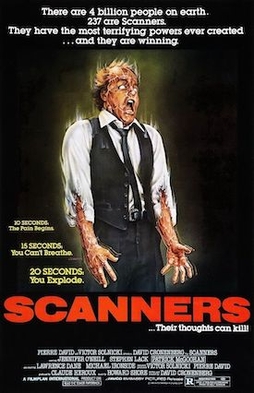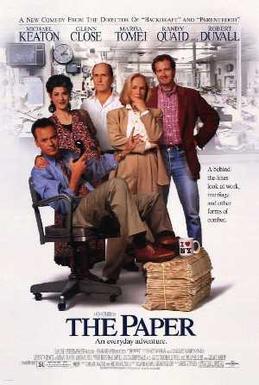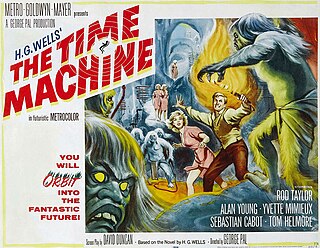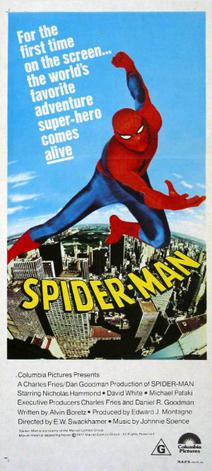Related Research Articles

Five Star Final is a 1931 American pre-Code drama film about the excesses of tabloid journalism directed by Mervyn LeRoy and starring Edward G. Robinson, Aline MacMahon and Boris Karloff. The screenplay was by Robert Lord and Byron Morgan based on the 1930 play of the same name by Louis Weitzenkorn. The title refers to the practice of newspapers publishing a series of editions throughout the day, with their final-edition front page having five stars printed and the word "Final." "Five Star Final" is also a font introduced during World War I and then favored by newspapers for its narrow type.

In public relations and politics, spin is a form of propaganda, achieved through knowingly providing a biased interpretation of an event or campaigning to influence public opinion about some organization or public figure. While traditional public relations and advertising may manage their presentation of facts, "spin" often implies the use of disingenuous, deceptive, and manipulative tactics.
A remake is a film, television series, video game, song or similar form of entertainment that is based upon and retells the story of an earlier production in the same medium—e.g., a "new version of an existing film". A remake tells the same story as the original but uses a different set of casts, and may use actors from the original, alter the theme, or change the flow and setting of the story, in addition since a remake is released some time after the original work it may incorporate new technologies, enhancements, and techniques that had not existed or was commonly used when the original work was created. A similar but not synonymous term is reimagining, which indicates a greater discrepancy between, for example, a movie and the movie it is based on.

A sequel is a work of literature, film, theater, television, music, or video game that continues the story of, or expands upon, some earlier work. In the common context of a narrative work of fiction, a sequel portrays events set in the same fictional universe as an earlier work, usually chronologically following the events of that work.

Scanners is a 1981 Canadian science fiction horror film written and directed by David Cronenberg and starring Stephen Lack, Jennifer O'Neill, Michael Ironside, and Patrick McGoohan. In the film, "scanners" are psychics with unusual telepathic and telekinetic powers. ConSec, a purveyor of weaponry and security systems, searches out scanners to use them for its own purposes. The film's plot concerns the attempt by Darryl Revok (Ironside), a renegade scanner, to wage a war against ConSec. Another scanner, Cameron Vale (Lack), is dispatched by ConSec to stop Revok.

William Harrison Hays Sr. was an American politician, and member of the Republican Party. As chairman of the Republican National Committee from 1918 to 1921, Hays managed the successful 1920 presidential campaign of Warren G. Harding. Harding then appointed Hays to his cabinet as his first Postmaster General. He resigned from the cabinet in 1922 to become the first chairman of the Motion Picture Producers and Distributors of America. As chairman, Hays oversaw the promulgation of the Motion Picture Production Code, which spelled out a set of moral guidelines for the self-censorship of content in American cinema.

Headlines was a segment that aired weekly on The Tonight Show with Jay Leno. It also aired on the prime-time spin-off The Jay Leno Show. The segment usually aired on Monday nights. It was first seen in 1987, when Leno was still a guest host on The Tonight Show Starring Johnny Carson, and continued until Jay Leno left The Tonight Show in 2014.

Mercury Rising is a 1998 American action thriller film starring Bruce Willis and Alec Baldwin. Directed by Harold Becker, the film is based on Ryne Douglas Pearson's 1996 novel originally published as Simple Simon, which was the working title of the film. Willis plays Art Jeffries, an undercover FBI agent who protects a nine-year-old autistic boy, Simon Lynch, who is targeted by government assassins after he cracks a top secret government code.

A disco ball is a roughly spherical object that reflects light directed at it in many directions, producing a complex display. Its surface consists of hundreds or thousands of facets, nearly all of approximately the same shape and size, and each has a mirrored surface. Usually, it is mounted well above the heads of the people present, suspended from a device that causes it to rotate steadily on a vertical axis, and illuminated by spotlights, so that stationary viewers experience beams of light flashing over them, and see myriad spots of light spinning around the walls of the room.

The Da Vinci Code is a 2006 mystery thriller film directed by Ron Howard, written by Akiva Goldsman, and based on Dan Brown's 2003 novel of the same name. The first in the Robert Langdon film series, the film stars Tom Hanks, Audrey Tautou, Ian McKellen, Alfred Molina, Jürgen Prochnow, Jean Reno and Paul Bettany. In the film, Robert Langdon, a professor of religious symbology from Harvard University, is the prime suspect in the grisly and unusual murder of Louvre curator Jacques Saunière. On the body, the police find a disconcerting cipher and start an investigation. Langdon escapes with the assistance of police cryptologist Sophie Neveu, and they begin a quest for the legendary Holy Grail. A noted British Grail historian, Sir Leigh Teabing, tells them that the actual Holy Grail is explicitly encoded in Leonardo da Vinci's wall painting, The Last Supper. Also searching for the Grail is a secret cabal within Opus Dei, an actual prelature of the Holy See, who wish to keep the true Grail a secret to prevent the destruction of Christianity.

The Paper is a 1994 American comedy-drama film directed by Ron Howard and starring Michael Keaton, Glenn Close, Marisa Tomei, Randy Quaid and Robert Duvall. It received an Academy Award nomination for Best Original Song for "Make Up Your Mind", which was written and performed by Randy Newman.

Time travel is a common theme in fiction, mainly since the late 19th century, and has been depicted in a variety of media, such as literature, television, film, and advertisements.

Land of the Pharaohs is a 1955 American epic historical drama film in CinemaScope and WarnerColor from Warner Brothers, produced and directed by Howard Hawks. The cast was headed by Jack Hawkins as Pharaoh Khufu and Joan Collins as one of his wives, Nellifer. The film is a fictional account of the building of the Great Pyramid. Nobel Prize-winning novelist William Faulkner was one of the film's three credited screenwriters.

Filler text is text that shares some characteristics of a real written text, but is random or otherwise generated. It may be used to display a sample of fonts, generate text for testing, or to spoof an e-mail spam filter. The process of using filler text is sometimes called greeking, although the text itself may be nonsense, or largely Latin, as in Lorem ipsum.

Spider-Man is a 1977 American television superhero film that aired on CBS and had a theatrical release outside the US, which serves as the pilot to the 1977 television series titled The Amazing Spider-Man. It was directed by E. W. Swackhamer, written by Alvin Boretz and stars Nicholas Hammond as the titular character, David White, Michael Pataki, Jeff Donnell and Thayer David.

Special Agent is a 1935 American crime drama film directed by William Keighley and starring Bette Davis and George Brent. The screenplay by Laird Doyle and Abem Finkel is based on a story by Martin Mooney. The film was produced by Cosmopolitan Productions and released by Warner Bros.

Broadway Musketeers is a 1938 American musical drama film directed by John Farrow for Warner Bros. Starring Margaret Lindsay, Ann Sheridan and Marie Wilson as three women who grew up in an orphanage and cross paths later in life, it is a remake of the Warners pre-code crime drama film, Three on a Match.

"The Night of the Doctor" is a mini-episode of the British science fiction television programme Doctor Who. It was made available on BBC iPlayer and YouTube on 14 November 2013, as part of the BBC One lead-up to the show's 50th anniversary special. It was written by Steven Moffat and starred Paul McGann as the Doctor.

City Without Men is a 1943 American film noir crime film directed by Sidney Salkow and starring Linda Darnell, Edgar Buchanan and Michael Duane. It was released by Columbia Pictures on January 14, 1943. A group of women lives in a boarding house near a prison where the residents are the wives of the prison inmates.

Charles E. Moritz v. Commissioner of Internal Revenue, 469 F.2d 466 (1972), was a case before the United States Court of Appeals for the Tenth Circuit in which the Court held that discrimination on the basis of sex constitutes a violation of the Equal Protection Clause of the United States Constitution. Charles Moritz had claimed a tax deduction for the cost of a caregiver for his invalid mother and the Internal Revenue Service had denied the deduction. The law specifically allowed such a deduction, but only for women and formerly married men, which Moritz was not.